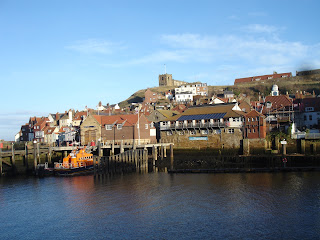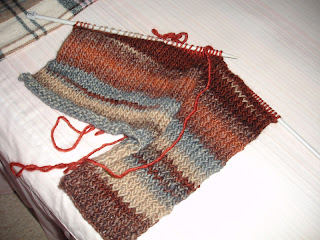Flicking through my Welsh Saint's book for stories on this ;
Halloween is of course the popular name for All Hallow's Eve, and is a night of superstition and ghost stories, so the Welsh have the same traditions as in other parts of the country, and of course a great feast which we sometimes forget about.
The reapers supper in Carmarthenshire usually had whipod - rice,bread, raisins currants and treacle.
In Anglesey the feast consisted of potatoes, turnips and oatcakes. In Carmathenshire, writing in 1760 "the contents of a brewing pan of beef and mutton, with arage and potatoes, and pottage, and pudding of wheaten flour, about 20 gallons of light ale and about 20 gallons of beer"
In Montgomeryshire on Nos Galan Gaeaf, a mash was made of nine ingredients (3 times 3 is a lucky number); leeks, potatoes, carrots, turnips, parsnips, peas, fresh milk, salt and pepper. A wedding ring was hidden in the mash (bit like a sixpenny bit in the xmas cake) and young maidens would dig in with wooden spoons anxious to learn their fate.
In Carmarthenshire the ceremony was also a feature around 9 ingredients, this time a pancake called stymp naw rhyw which was made by 9 girls, who ate a piece each.
Apple bobbing was popular, and wassailing was also carried out, with punch being drunk from 'puzzle jugs'
This tale I find funny; In the Vale of Glamorganshire, spirits roamed the churchyards at night, and the bravest villager would don his coat and vest inside out, reciting the Lord's Prayer backwards as he walked around the church a number of times. Then he would walk up to the church porch and place his finger in the keyhole to prevent spirits from escaping! It was also believed that apparitions of those about to die could also be seen through the keyhole.
And the tale of trick or treating? Well in other parts of Wales, youths would dress up in girls' clothes and vice-versa and groups of young people would wander from house to house in the dark chanting verses and soliciting gifts of fruit and nuts..In other areas men would dress up in sheepskins and blacked their faces and were given gifts of nuts, apple and beer. These groups were known as the
gwrachod (hags, or witches) and were meant to bring good tidings and expel bad spirits from the household.
And as the celtic 'old year' disappears, on this last night it was a tradition for a local Ladi Wen (ghost of the white lady) too appear, but then in North Wales it was more often the terrible Hwch Ddu Gwta (tailess black sow - another celtic tradition). Bonfires were lit on hillsides, apples and potatoes were roasted and the watchers would dance and leap through the flames for good luck in the forthcoming year. Stones were thrown into the fire, and as the flames died down, everyone would rush home to escape the clutches of the great black pig. If you found your stone in the morning in the fire then luck would follow, if not misfortune would follow...
Tales told from T.D.Breverton - The Book of Welsh Saints.
And wishing we were in Whitby so that we could experience St.Mary's churchyard this night, a tale told in the Guardian;
If you like spectacular ghosts, they don't come better than the phantom hearse of Whitby. They say that when a Whitby sailor was buried in St Mary's churchyard, a large hearse with four jet-black horses would appear beside the grave at night, ready to take him away. A group of ghostly mourners would appear from the coach and remove the body from its grave. The spectral coach, lit by burning torches and driven by a headless phantom coachman shrouded in a black cloak, would then gallop away at speed and plummet over the cliffs into the sea.
http://northstoke.blogspot.co.uk/2009/10/wild-hunt-at-halloween.html





















































